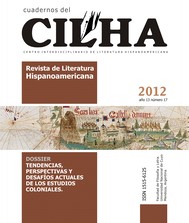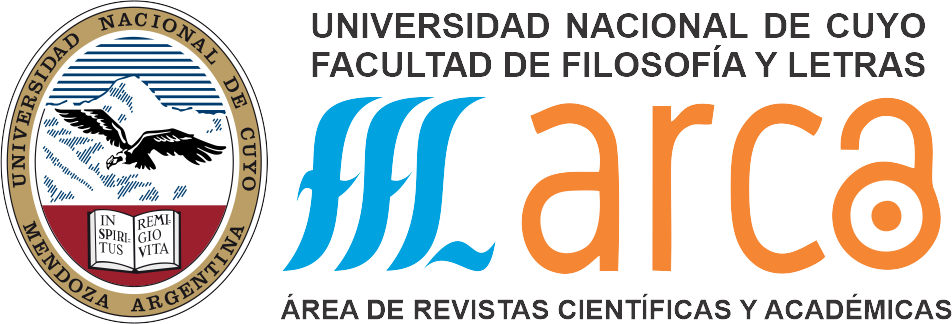New Critical Incursions into Caribbean Colonial Studies: Ecocriticism
Keywords:
Ecological difference, Colonial Caribbean, Taíno, Ramón Pané, EcocriticismAbstract
The article begins by defining the field of ecological criticism as it has developed in North America by identifying characteristics, methodologies and the possibilities of this kind of analysis, which points towards an interdisciplinary reconfiguration of literary studies. Throughout the text the political charge of the theory and its parallelisms to critiques of capitalism and modernity are underlined. In addition, the paper emphasizes its anglocentrism and overvaluing of specific genres calling for more openness in the interpretation of any cultural production. As an example of an ecocritical analysis, the concept of ecological difference as a marker of difference within the racial discourse of late 15th and through the 16th century is discussed in Ramón Pané, Relation of the Antiquities of the Indians, 1498. The discussion demonstrates the usefulness of the use of ecological difference as a fourth category of analysis alongside gender, race/ethnicity, and class.
References
Buell, Lawrence. The Future of Environmental Criticism: Environmental Crisis and Literary Imagination. Malden, MA: Wiley-Blackwell, 2005.
Buell, Lawrence. Writing for an Endangered World Cambridge: Literature, Culture and the Environment in the U.S. and Beyond. Cambridge: Belknap Press of Harvard Univ. Press. 2001.
Chaves Maldonado, María Eugenia. "La creación del ‘Otro’ colonial. Apuntes para un estudio de la diferencia en el proceso de la conquista americana y de la esclavización de los africanos". En: María Eugenia Chaves Maldonado (ed.). Genealogías de la diferencia: Tecnologías de la salvación y representación de los africanos esclavizados en Iberoamérica colonial. Bogotá: Pontifica Universidad Javeriana, 2009.
Cuba. Ministerio de Ciencia, Tecnología y Medio Ambiente. "Situación Ambiental Cubana". La Habana, 2004. Extraído el 30 de marzo de 2012 desde: http://www.medioambiente.cu/download/2003/Presentaci%F3n.pdf
DeLoughrey, Elizabeth M., Renée K. Gosson y George B. Handley. Caribbean Literature and the Environment: Between Nature and Culture. Charlottesville: University of Virginia Press, 2005.
DeLoughrey, Elizabeth, George B. Handley. Postocolonial Ecologies: Literatures of the Environment. Nueva York: Oxford UP, 2011.
Dussel, Enrique. 1492. El encubrimiento del Otro: Hacia el origen del "mito de la Modernidad". La Paz: CID, Universidad Mayor de San Ándres, 1994.
Ferrer-Medina, Patricia. "Ecology, Difference, and Utopia in the Portrayal of the Gypsy in Cervantes’ La gitanilla (1613)". En: Julio Vélez-Sains y Nieves Romero-Díaz (eds.). Cervantes and/on/in the New World. Newark, DE: Juan de la Cuesta, 2007.
Garrard, Greg. Ecocriticism. Nueva York: Routledge, 2004.
Greenblatt, Stephen. Renaissance Self-Fashioning: From More to Shakespeare. Chicago: University of Chicago Press, 1980.
Grove, Richard. Green Imperialism: Colonial Expansion, Tropical Island Edens and the Origins of Environmentalisms, 1600-1860. Cambridge, Cambridge University Press, 1995.
Hulme, Peter. Colonial Encounters: Europe and the Native Caribbean, 1492-1797. Londres: Routledge, 1992.
Kane, Adrian Taylor. The Natural World in Latin American Literatures: Ecocritical Essays on Twentieth Century Writings. Jefferson, NC: Mcfarland, 2010.
López Baralt, Mercedes. El mito taíno: Lévi-Strauss en las antillas. Río Piedras: Ediciones Huracán, 1985.
Mignolo, Walter D. Historias locales/diseños globales: Colonialidad, conocimiento subalterno y pensamiento fronterizo. Madrid: Ed. Alkal, 2003.
Mignolo, Walter D. La idea de América Latina: La herida colonial y la opción decolonial. Barcelona: Gedisa, 2007.
Oliver, José R. Caciques and Cemí Idols: The Web Spun by Taíno Rulers Between Hispaniola and Puerto Rico. Tuscaloosa: University of Alabama Press, 2009.
Organización de Naciones Unidas. Oficina Regional para América Latina y el Caribe del Programa de las Naciones Unidas para el Medio Ambiente. Gráficos Vitales del cambio climático para América Latina y El Caribe. Panama City, 2010. Extraído el 30 de marzo de 2012 desde: http://www.pnuma.org/informacion/comunicados/2010/6Diciembre2010/LAC_Web_esp_2010-12-07.pdf
Juan José Arrom (ed.). Pané, Ramón. Relación acerca de las antigüedades de los indios. México: Siglo XXI Editores, 1974.
Pico della Mirandola, Giovanni. Discurso sobre la dignidad del hombre. Extraído el 2 de abril de 2012 desde: http://www.scribd.com/doc/25331560/Discurso-sobre-la-dignidad-del-hombre-Pico-Della-Mirandola
Plumwood, Val. Feminism and the Mastery of Nature. Londres: Routledge, 1993.
Richards, John F. The Unending Frontier: An Environmental History of the Early Modern World. Berkeley: University of California Press, 2003.
Rivera-Barnes, Beatriz, Jerry Hoeg. Reading and Writing the Latin American Landscape. Nueva York: Palgrave, 2009.
Chris Campbell y Erin Somerville (eds.). ‘What is the Earthly Paradise?’ Ecocritical Responses to the Caribbean. Newcastle, RU: Cambridge Scholars Publishing, 2007.
Young, Robert. Colonial Desire: Hibridity in Theory, Culture, and Race. New York: Routledge, 1995.





















